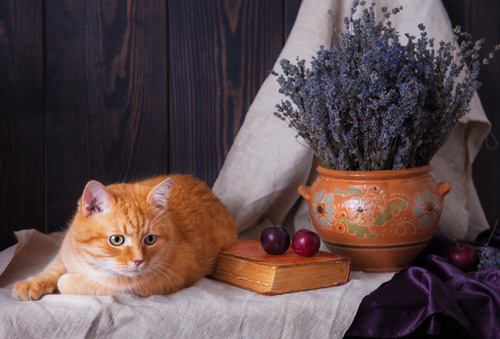Lavender, known for its soothing aroma and therapeutic properties, is a popular plant in many households. However, pet owners, especially cat owners, often wonder if this fragrant herb poses any risk to their feline companions. In this blog, we’ll explore whether lavender is safe for cats, discussing its potential benefits and risks, and providing guidance to ensure your cat’s safety and well-being. If you have concerns or need more information, contact Harlingen Veterinary Clinic at (908) 359-2000.
Understanding Lavender and Its Effects on Cats
Lavender contains linalool and linalyl acetate, compounds that are aromatic and beneficial in aromatherapy for humans but can be problematic for cats. Cats lack certain enzymes in their liver to effectively process these compounds, which can lead to a buildup of toxins. It’s important to understand the forms of lavender and how they interact with cats.
Exposure to Lavender: Essential Oils vs. Plant Form
Essential Oils
Essential oils are highly concentrated and pose a significant health risk to cats. Even passive inhalation from a diffuser can lead to symptoms of toxicity in cats. Signs include difficulty breathing, drooling, fatigue, and muscle tremors.
Fresh and Dried Lavender
In contrast, the fresh or dried form of lavender is less potent but still can be harmful if ingested in large quantities. It’s best to keep lavender plants and floral arrangements out of reach of curious cats.
Symptoms of Lavender Toxicity in Cats
If your cat is exposed to lavender, particularly in essential oil form, they may exhibit symptoms that warrant immediate attention. Common signs of lavender toxicity include:
- Digestive Distress: Vomiting or diarrhea can occur if your cat ingests lavender.
- Neurological Symptoms: Watch for unusual behaviors such as depression, disorientation, or excessive licking.
- Physical Reactions: Severe cases might involve tremors, lethargy, or difficulty breathing.
If you notice any of these symptoms, contact Harlingen Veterinary Clinic immediately.
Preventive Measures to Protect Your Cat
Keeping your cat safe from the potential risks of lavender involves several straightforward precautions:
- Always store lavender essential oils and products in a location inaccessible to your cat.
- Consider using lavender-scented products that are specifically formulated to be safe for pets.
- If you grow lavender at home, ensure it’s out of reach, and monitor your cat’s behavior for any signs of distress.
Consulting Your Veterinarian
When it comes to your pet’s safety and the use of plants like lavender in your home, it’s always best to consult with professionals. If you’re considering using any form of lavender in your home, discuss it with your veterinarian at Harlingen Veterinary Clinic. They can provide personalized advice based on your cat’s health, ensuring their safety around lavender.
Keeping Your Cat Safe From Lavender
While lavender offers many benefits for humans, it presents certain risks to cats, particularly in its essential oil form. By understanding these risks and taking appropriate measures, you can enjoy the benefits of lavender without compromising your cat’s health and safety. Remember, if you ever have doubts or notice any signs of discomfort in your cat, a quick call to Harlingen Veterinary Clinic at (908) 359-2000 can provide you with the guidance and support you need to ensure your feline friend’s well-being.





